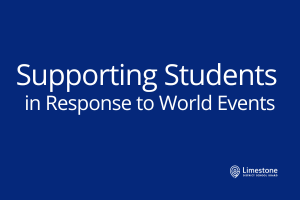 Many events taking place globally increase feelings of distress for students locally. World events, like war, accidents, natural disasters, mass violence, civil disorder, and conflict can impact individuals, classes, schools, communities and beyond, depending on their nature and scope. It is not uncommon for young people, and adults, to experience a range of emotions and to have questions about challenging world events. How students react to events will vary.
Many events taking place globally increase feelings of distress for students locally. World events, like war, accidents, natural disasters, mass violence, civil disorder, and conflict can impact individuals, classes, schools, communities and beyond, depending on their nature and scope. It is not uncommon for young people, and adults, to experience a range of emotions and to have questions about challenging world events. How students react to events will vary.
School Mental Health Ontario (SMHO) offers a range of supports for students, families, and educators. The resources provided by SMHO may help you support your student at this time:
- Listen to understand, not necessarily respond.
- If your student is not focused on the conflict do not dwell on it. Try to avoid having detailed adult conversations regarding the conflict in front of younger children. However, be available to answer questions to the best of your ability. Young children may not be able to express themselves verbally. Pay attention to changes in their behaviour or social interactions.
- For some, limiting exposure to media coverage may be important. Images of a disaster or crisis can become overwhelming, especially if watched repetitively. Young children may not be able to distinguish between images on television and their personal reality. Older children may choose to watch the news—be available to discuss what they see and to help put it into perspective.
- Be aware of your own needs. Don’t ignore your own feelings of anxiety and concern or anger. Talking to friends, family members, and mental health counsellors can help. Let them know you are concerned. You will be better able to support them if you can express your own emotions in a productive manner.
Canadian Paediatric Society has also posted tips for parents/caregivers to help support children and youth who may be experiencing feelings of anxiety, sadness, distress, isolation, or fear as a result of the Middle East conflict and associated social media images and videos circulating.
Our top priority remains to be the safety and well-being of our students. This is a responsibility we take very seriously. Additional resources are also available herehttps://bit.ly/3QaDt3K
Kindergarten Registration
Discover Kindergarten in Limestone and register your student for the 2026-2027 school year today!


